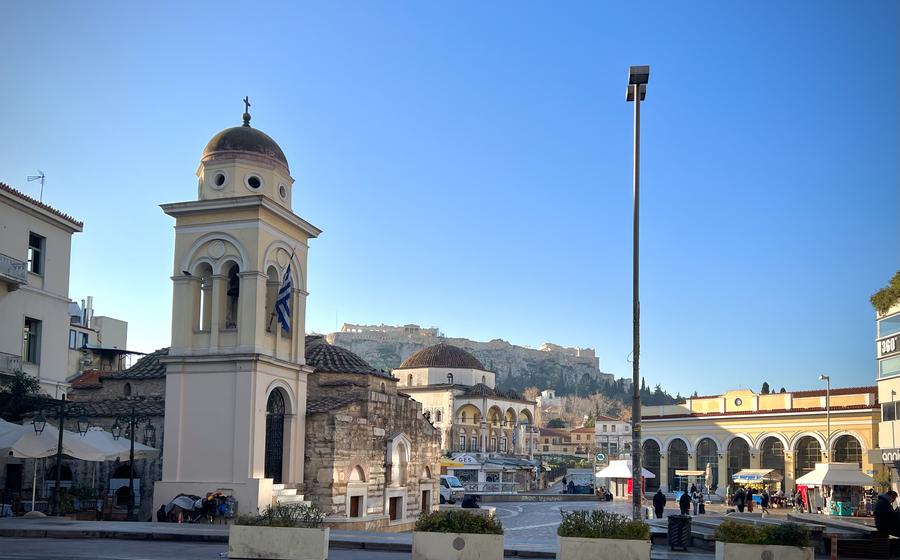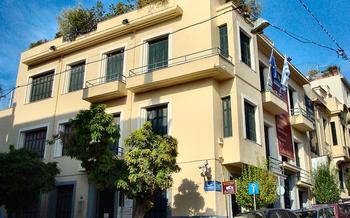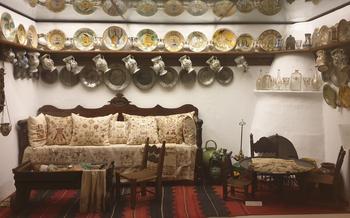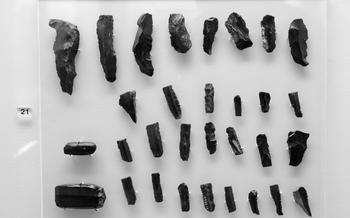
Museum of Greek Gastronomy
- Historical Background
- Location and Accessibility
- Museum Highlights
- Thematic Exhibitions
- Culinary Workshops and Classes
- Tasting Experiences
- Museum Shop and Souvenirs
- Educational Programs
- Research and Publications
- Community Involvement
- Sustainability and Local Sourcing
- Accessibility and Inclusivity
- Volunteer Opportunities
- Events and Festivals
- Insider Tip:
Historical Background
Greece, a land steeped in ancient history and culinary traditions, boasts a rich gastronomic heritage that has evolved over the centuries. Food has always played a significant role in Greek culture, with its flavors and aromas deeply intertwined with the nation's identity.
The ancient Greeks held symposia, elaborate banquets where food, wine, and conversation flowed freely. These gatherings celebrated life, fostered camaraderie, and stimulated philosophical discussions. Greek cuisine was influenced by the abundant local produce, such as olives, grapes, wheat, and honey, and was characterized by its simplicity and balance.
Over time, Greek gastronomy absorbed influences from various civilizations that ruled the region, including the Romans, Byzantines, and Ottomans. Each empire left its mark on Greek cuisine, introducing new ingredients, techniques, and flavors. The result is a diverse and vibrant culinary landscape that showcases the unique fusion of ancient traditions with modern innovations.
The Museum of Greek Gastronomy stands as a testament to this rich culinary heritage, offering visitors a journey through the history and evolution of Greek cuisine, from its ancient roots to its contemporary expressions.
Location and Accessibility
The Museum of Greek Gastronomy is conveniently located in the heart of Athens, at 118 Vasilissis Olgas Avenue, making it easily accessible by various modes of transportation. Visitors arriving by metro can disembark at the Evangelismos station on Line 3 (blue line), just a short walk from the museum. Alternatively, numerous bus lines, including the 204, 224, A5, and E22, stop within a few minutes' walk of the museum. For those arriving by car, there is limited street parking available, and a nearby public parking lot offers additional options. The museum's central location places it within easy reach of other popular attractions, such as the National Archaeological Museum, the Byzantine and Christian Museum, and the Benaki Museum, making it an ideal stop on a cultural tour of Athens.
Museum Highlights
The Museum of Greek Gastronomy boasts a treasure trove of captivating exhibits that delve into the rich history and diverse flavors of Greek cuisine. Among the highlights is a collection of traditional Greek cooking utensils and tools, offering visitors a glimpse into the culinary practices of the past. Interactive displays and cooking demonstrations showcase the artistry of Greek chefs and provide hands-on experiences for visitors to learn about different cooking techniques and traditional recipes. The museum is divided into various sections, each dedicated to a specific aspect of Greek gastronomy, such as the history of Greek cuisine, the influence of different civilizations, and the regional variations of Greek dishes. Whether you're a seasoned foodie or simply curious about Greek culture, the Museum of Greek Gastronomy offers a multisensory journey that will leave you inspired and hungry for more.
Thematic Exhibitions
The Museum of Greek Gastronomy is not just a static display of culinary history; it also hosts a variety of temporary or rotating exhibitions that delve deeper into specific aspects or themes of Greek cuisine. These exhibitions offer visitors a chance to explore new dimensions of Greek food culture and keep the museum's content fresh and engaging.
In the past, the museum has hosted exhibitions such as "The Art of Greek Cheesemaking," which showcased the diverse range of traditional Greek cheeses and their production methods. Another exhibition, "From Vine to Table: The Story of Greek Wine," explored the rich history of Greek winemaking and its role in Greek culture.
These thematic exhibitions contribute to the museum's mission by providing visitors with a more comprehensive understanding of Greek gastronomy. They highlight the diversity and evolution of Greek cuisine, while also shedding light on the cultural and historical factors that have shaped it. The exhibitions also promote the appreciation and preservation of traditional Greek culinary practices.
Currently, the museum is hosting an exhibition titled "The Flavors of the Mediterranean: A Culinary Journey," which explores the culinary connections and influences between Greece and its Mediterranean neighbors. The exhibition showcases dishes, ingredients, and cooking techniques that have been shared and adapted over centuries, creating a vibrant tapestry of Mediterranean cuisine.
Upcoming exhibitions include "Greek Street Food: A Culinary Adventure," which will delve into the world of popular Greek street food dishes, and "The Legacy of Greek Desserts," which will celebrate the sweet side of Greek gastronomy.
Culinary Workshops and Classes
The Museum of Greek Gastronomy offers a range of culinary workshops and classes that provide visitors with the opportunity to learn the art of Greek cooking firsthand. These classes are designed for all skill levels, from beginner to advanced, and cater to both individuals and groups.
The classes cover a wide variety of Greek dishes, from traditional recipes passed down through generations to modern interpretations of classic favorites. Participants learn essential cooking techniques, such as preparing phyllo dough, making homemade yogurt, and grilling meats and vegetables to perfection.
One of the highlights of the classes is the hands-on experience of working with fresh, local ingredients. The museum's chefs guide participants through each step of the cooking process, ensuring that they understand the nuances of Greek cuisine and the importance of using high-quality ingredients.
Whether you're a seasoned home cook looking to expand your repertoire or a complete novice eager to learn the basics, the Museum of Greek Gastronomy's cooking classes offer a unique and immersive experience that will leave you with a newfound appreciation for Greek culinary traditions.
One memorable moment I had during a cooking class was when I learned to make spanakopita, a traditional spinach and feta pie. The chef showed us how to prepare the phyllo dough from scratch, and we spent the next hour carefully layering the dough with spinach, feta, and herbs. The result was a delicious and flaky pie that we all enjoyed together.
Tasting Experiences
Indulge in the delectable flavors of Greek cuisine through the museum's tasting experiences. Led by knowledgeable guides, these tastings allow visitors to sample a variety of Greek delicacies, including olive oil, cheese, and wine. Learn about the production process, history, and cultural significance of each product as you savor its unique taste.
One of the highlights of the tasting experience is the olive oil tasting. Greece is renowned for its olive oil production, and the museum showcases a diverse range of oils from different regions. Discover the subtle nuances and flavors that distinguish each olive variety, and learn how to identify high-quality olive oil.
The cheese tasting offers a journey through the rich world of Greek cheeses. From creamy feta to tangy kefalotyri, each cheese has a unique story to tell. Learn about the traditional methods of cheesemaking and the importance of cheese in Greek cuisine.
No tasting experience in Greece would be complete without wine. The museum's wine tasting introduces visitors to the diverse wine regions of Greece and the distinct characteristics of Greek grape varieties. Sip on a glass of Assyrtiko from Santorini, a robust Agiorgitiko from the Peloponnese, or a sweet Mavrodaphne from Patras, and discover the passion and dedication of Greek winemakers.
Whether you're a food enthusiast, a culinary professional, or simply someone who loves to savor delicious food, the Museum of Greek Gastronomy's tasting experiences offer an unforgettable journey into the heart of Greek cuisine.
Museum Shop and Souvenirs
The museum's gift shop is a treasure trove of culinary delights and unique souvenirs. From traditional Greek pottery and handmade ceramics to aromatic spices and exquisite olive oils, visitors can find a wide variety of items to take home. The shop also offers a selection of cookbooks, recipe books, and culinary guides, allowing visitors to continue their exploration of Greek cuisine at home.
One of the most popular souvenirs is the traditional Greek coffee pot, known as a briki. These handcrafted pots are made of copper or stainless steel and are used to prepare the strong, aromatic Greek coffee. Visitors can also find a variety of Greek herbs and spices, such as oregano, thyme, and saffron, as well as specialty products like sea salt from the Aegean Sea and mountain tea from Crete.
To truly capture the essence of Greek cuisine, visitors can purchase a bottle of extra virgin olive oil, a staple ingredient in Greek cooking. The museum shop offers a selection of oils from different regions of Greece, each with its own unique flavor and aroma. For those who prefer something sweeter, there is a wide variety of Greek honey, jams, and preserves to choose from.
By purchasing souvenirs from the museum shop, visitors not only take home a piece of Greek culinary heritage but also support the museum's mission to preserve and promote Greek cuisine. The revenue generated from the shop helps to fund the museum's educational programs, research initiatives, and community outreach activities.
Educational Programs
The Museum of Greek Gastronomy recognizes the importance of educating the public about the rich culinary heritage of Greece. To this end, it offers a variety of educational programs designed to engage visitors of all ages and backgrounds.
These programs include lectures, seminars, and workshops that delve into various aspects of Greek cuisine, from the history and evolution of traditional dishes to the techniques and ingredients used in their preparation. The target audience for these programs is diverse, encompassing food enthusiasts, culinary professionals, and anyone interested in learning more about Greek gastronomy.
The museum's educational programs play a vital role in promoting and preserving Greek culinary heritage. Through these programs, the museum aims to inspire a new generation of chefs, food writers, and culinary enthusiasts who will carry on the traditions of Greek cuisine and contribute to its continued evolution.
One of the museum's most successful educational programs is the "Taste of Greece" series, a collection of culinary workshops that offer participants the opportunity to learn how to cook authentic Greek dishes under the guidance of experienced chefs. These workshops are immensely popular, with participants coming from all over the world to learn the secrets of Greek cuisine.
Another notable program is the "History of Greek Cuisine" lecture series, which explores the fascinating journey of Greek food from ancient times to the present day. These lectures are presented by renowned culinary historians and provide an in-depth look at the influences that have shaped Greek gastronomy over the centuries.
Through its educational programs, the Museum of Greek Gastronomy is fulfilling its mission to promote and preserve the culinary heritage of Greece while inspiring a new generation of food enthusiasts to carry on its traditions.
Research and Publications
The Museum of Greek Gastronomy is not just a showcase for culinary delights; it is also a hub of culinary research and documentation. The museum's team of experts is dedicated to preserving and promoting Greek culinary heritage through extensive research and publications.
The museum's publications include cookbooks, research papers, and historical accounts that explore the diverse aspects of Greek cuisine. These publications are invaluable resources for culinary enthusiasts, researchers, and anyone interested in the history and evolution of Greek food.
One of the museum's most significant publications is the "Encyclopedia of Greek Gastronomy." This comprehensive work is a testament to the museum's commitment to documenting and preserving Greek culinary traditions. The encyclopedia covers a wide range of topics, from traditional recipes and cooking techniques to the history of Greek food and its cultural significance.
The museum's research and publications have played a vital role in promoting Greek gastronomy on a global scale. By sharing the richness and diversity of Greek cuisine with the world, the museum is helping to preserve and celebrate this important cultural heritage.
Community Involvement
The Museum of Greek Gastronomy is deeply rooted in the local community and actively participates in various events and initiatives aimed at promoting Greek cuisine and culinary traditions. The museum collaborates with local businesses, chefs, and food enthusiasts to organize workshops, cooking demonstrations, and food festivals. These events provide a platform for local producers to showcase their products, exchange knowledge and expertise, and foster a sense of community among food lovers.
One of the museum's notable community initiatives is its partnership with local farmers and producers. The museum hosts regular farmers' markets, where visitors can purchase fresh, seasonal produce directly from the farmers. This initiative supports local agriculture, promotes sustainable farming practices, and educates visitors about the importance of seasonal eating.
The museum also organizes educational programs for children and adults, focusing on Greek culinary heritage and healthy eating habits. These programs include interactive workshops, cooking classes, and guided tours of the museum's exhibits. Through these initiatives, the museum aims to inspire the next generation of food enthusiasts and promote a greater appreciation for Greek cuisine.
Sustainability and Local Sourcing
The Museum of Greek Gastronomy is committed to sustainability and local sourcing, recognizing the importance of supporting the local community and reducing its environmental impact. The museum collaborates with local farmers and producers to showcase and promote authentic Greek ingredients. By sourcing ingredients from local suppliers, the museum helps to preserve traditional farming practices and ensures the freshness and quality of the products used in its exhibits and cooking classes.
The museum also actively reduces food waste through various initiatives. Surplus food from cooking demonstrations and workshops is donated to local charities and organizations, ensuring that it is not wasted. Additionally, the museum composts organic waste and uses it to fertilize the garden, promoting a circular and sustainable approach to resource management.
The museum's commitment to sustainability extends to its operations as well. It uses energy-efficient lighting and appliances, and recycles and composts waste to minimize its environmental footprint. The museum's efforts have been recognized and appreciated by visitors and the local community, setting an example for other institutions to follow.
Accessibility and Inclusivity
The Museum of Greek Gastronomy is committed to making its exhibits and programs accessible to all visitors, regardless of their abilities or needs. The museum features wheelchair-accessible ramps and elevators, wide doorways, and clear signage. It also offers audio guides in multiple languages and provides transcripts of presentations and videos for visitors who are deaf or hard of hearing. The museum staff is trained to assist visitors with disabilities and can provide additional support if needed.
One of the most heartwarming stories of the museum's inclusivity efforts involves a young girl named Maria. Maria has cerebral palsy and uses a wheelchair. When she visited the museum with her family, she was thrilled to discover that she could easily navigate the exhibits and participate in the interactive activities. She was particularly fascinated by the cooking demonstration and watched intently as the chef prepared a traditional Greek dish. After the demonstration, Maria approached the chef and asked if she could try her hand at cooking. The chef was delighted and patiently guided Maria through the steps of making a simple Greek salad. Maria's parents were so grateful to the museum for creating an environment where their daughter felt included and empowered.
Volunteer Opportunities
The Museum of Greek Gastronomy welcomes volunteers from all walks of life who share a passion for Greek cuisine and culture. Volunteering at the museum is a rewarding experience that offers opportunities to learn, contribute, and make a difference.
Volunteers at the Museum of Greek Gastronomy play a vital role in supporting the museum's mission and activities. They assist with various tasks such as leading cooking demonstrations, conducting educational workshops, providing visitor guidance, and assisting with research and documentation projects.
The museum offers flexible volunteer schedules to accommodate the availability of individuals. Volunteers can choose to work on a regular basis or on specific projects. Training is provided to ensure that volunteers have the necessary skills and knowledge to fulfill their roles effectively.
By volunteering at the Museum of Greek Gastronomy, individuals not only gain valuable experience and make connections within the culinary community, but they also contribute to the preservation and promotion of Greek culinary heritage. It is a unique opportunity to be part of a team that is dedicated to celebrating and sharing the richness of Greek cuisine with the world.
If you are passionate about Greek food and culture and are looking for a meaningful volunteer experience, the Museum of Greek Gastronomy invites you to join its team of dedicated volunteers.
Events and Festivals
Throughout the year, the Museum of Greek Gastronomy hosts a variety of events and festivals that celebrate Greek culinary traditions and promote cultural exchange. These events offer visitors a unique opportunity to experience the vibrant and diverse flavors of Greek cuisine.
One of the most popular events is the Annual Greek Food Festival, held every summer. The festival features a wide range of traditional Greek dishes, live music, and dancing. Visitors can sample everything from souvlaki and gyros to baklava and loukoumades, while enjoying the lively atmosphere and the chance to mingle with locals and fellow food enthusiasts.
Another highlight is the Olive Oil Festival, which takes place in the fall. This festival celebrates the importance of olive oil in Greek cuisine and culture. Visitors can learn about the different varieties of olives and olive oil, as well as the traditional methods of production. There are also opportunities to sample different olive oils and purchase bottles to take home.
In addition to these annual events, the museum also hosts regular workshops, cooking demonstrations, and lectures. These events provide visitors with the chance to learn more about Greek cuisine and its history, and to get hands-on experience with traditional cooking techniques.
Whether you are interested in learning more about Greek food, sampling some of the country's most delicious dishes, or simply enjoying a festive atmosphere, the Museum of Greek Gastronomy's events and festivals are not to be missed.
Insider Tip:
For an immersive culinary experience, plan your visit during the museum's annual "Taste of Greece" festival. This vibrant event showcases the diverse flavors of Greek cuisine through live cooking demonstrations, tastings, and workshops led by renowned chefs and food experts. It's a fantastic opportunity to indulge in authentic dishes, learn from the masters, and savor the true essence of Greek gastronomy. Don't miss the chance to take part in this culinary extravaganza and create lasting memories in the heart of Athens.
As you stroll through the museum's exhibits, don't forget to stop by the charming café for a delightful break. Sip on aromatic Greek coffee, savor traditional pastries, and soak in the ambiance of this culinary haven. The café offers a unique opportunity to relax and reflect on the rich history and flavors you've encountered during your visit.
Remember, the Museum of Greek Gastronomy is more than just a museum; it's a living testament to the enduring legacy of Greek cuisine. As you explore its exhibits, attend its events, and savor its flavors, you'll gain a deeper appreciation for the culinary traditions that have shaped Greece's identity for centuries.









